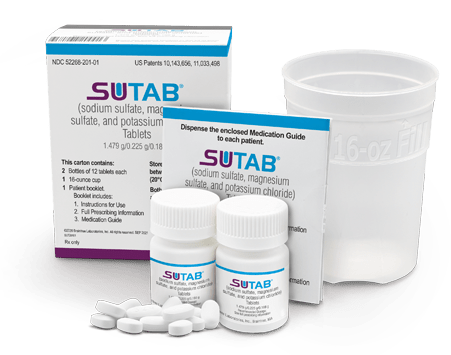Fast Facts:
- The goal of a bowel prep is to completely clean out your colon so the doctor can see every part to check for signs of cancer (or other disease).
- One of the main reasons people say they avoid a recommended colonoscopy is the reluctance to do the bowel prep.
- There are modifications for traditional bowel preps, including flavorings and reduced volumes, that can make them more tolerable. There are also newer preps that use pills and water, which avoid the main complaints people have about bowel preps.

Colorectal cancer is the second most common cause of cancer death in the US. And colon cancer is on the rise in younger people. Last year the CDC recommended dropping the age to get your first screening from 50 to 45. Screening tests, such as a colonoscopy, have been shown to reduce the occurrence of colon cancer.
But, you may be avoiding your recommended colonoscopy because you’ve heard the bowel prep is awful.
There are lots of reasons to want to avoid it altogether: It tastes horrible! I can’t drink a gallon of liquid! All that time on the toilet!
Well, doctors can’t make the time on the toilet any shorter. A good, clean bowel is the key to a good colonoscopy. But, bowel preps have gotten easier over the past few years. Let’s take a look at which option might be best for you.
What’s in a Bowel Prep Kit?
All types of prep kits rely on an osmotic laxative and electrolytes to help you clear your bowels (poop). The laxative can’t be absorbed by your body, so it stays in your gut and draws water to it. As the water volume builds up in your gut, it causes the bowel to stretch. Stretching is a signal to your bowels to empty. That’s why you have the urge to have a bowel movement.
Since you’re dumping large amounts of water along with the laxative and stool, you have to replace the electrolytes that go along for the ride.
PEG (polymer-based) Bowel Preps
PEG (or polyethylene glycol 335)-based bowel preps are the most commonly used. They’re inexpensive and are very effective.
PEG bowel preps include:
- Miralax
- GoLytely
- CoLyte
- Halflytely
- Others
Sometimes people don’t finish the prep because they can’t tolerate the taste or they aren’t able to drink all the liquid.
The good news is that there are modifications that make PEG preps more tolerable. For example, there are flavoring packets that you can add to the laxative. Or you may be able to mix the laxative with a clear, non-carbonated drink of your choice (think Gatorade or Propel).
And some of the prep regimens add a second laxative such as bisacodyl (Dulcolax) so that the volume of liquid you have to drink is reduced. Sometimes the amount you drink can be cut in half.
Sodium Phosphate-based (NaP) Bowel Preps
Just like with PEG-based preps, these use an osmotic laxative. In this case the laxative is a chemical called sodium phosphate.
Some of the NaP-based kits include:
The advantage of NaP-based bowel preps is that they come in a pill form. You still have to drink a significant amount of water in a short period of time. But the taste is not an issue. The volume of liquid is also smaller. Many people report being better able to complete the prep as directed.
NaP preps are as effective as PEG preps. Because NaP contains certain salts, they may cause some stomach irritation. They may not be the best choice for people with some medical conditions. Your doctor can help you decide if they are right for you.
Considerations
There are a number of things to consider when deciding on which bowel prep to use. Talk to your doctor ahead of time, so you can make an informed decision. Some of the topics you should address are:
- Taste
- How much can you drink?
- Medical conditions you may have
- Does your insurance cover the cost of the prep or will it be out of pocket?
- Does your doctor have a standard prep? Most will offer different options if you ask. They will give you a complete set of instructions for whichever one you use.
- Which prep are you most likely to completely follow the directions with?
Remember, if you are unable to fully clear your bowels, there’s a good chance you might have to be rescheduled. Your doctor relies on being able to see your bowel clearly to assess abnormal areas. If there’s a little bit of stool in your bowels, they may be able to wash it away. If there’s a lot of stool, they’ll ask you to prep again and come back another day.
The Bottom Line
A good, clean bowel prep is essential for a good colonoscopy. The best prep is the one whose directions you can follow completely. Talk to your doctor about which one is right for you. The most important thing is that you get checked when it’s time. Check it for the people who love you. CheckIt4Andretti!
Here is a short video with some tips for having a good bowel prep. Remember, these are just tips. Always follow your own doctor’s exact instructions.